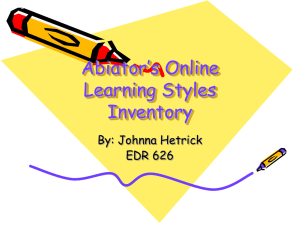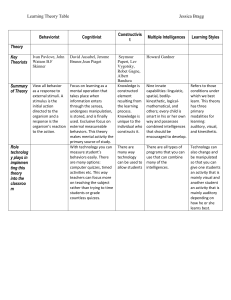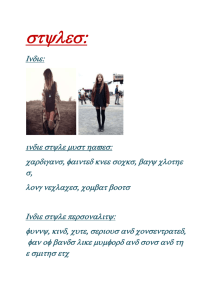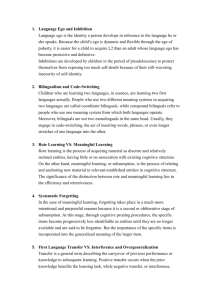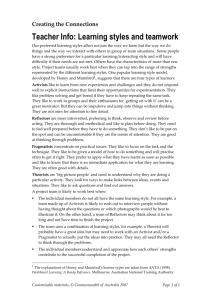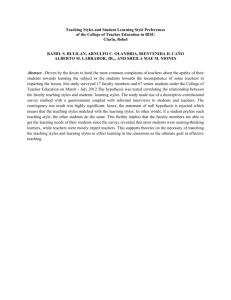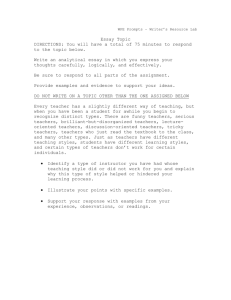Differentiating Instruction to Accommodate Learning Styles
advertisement
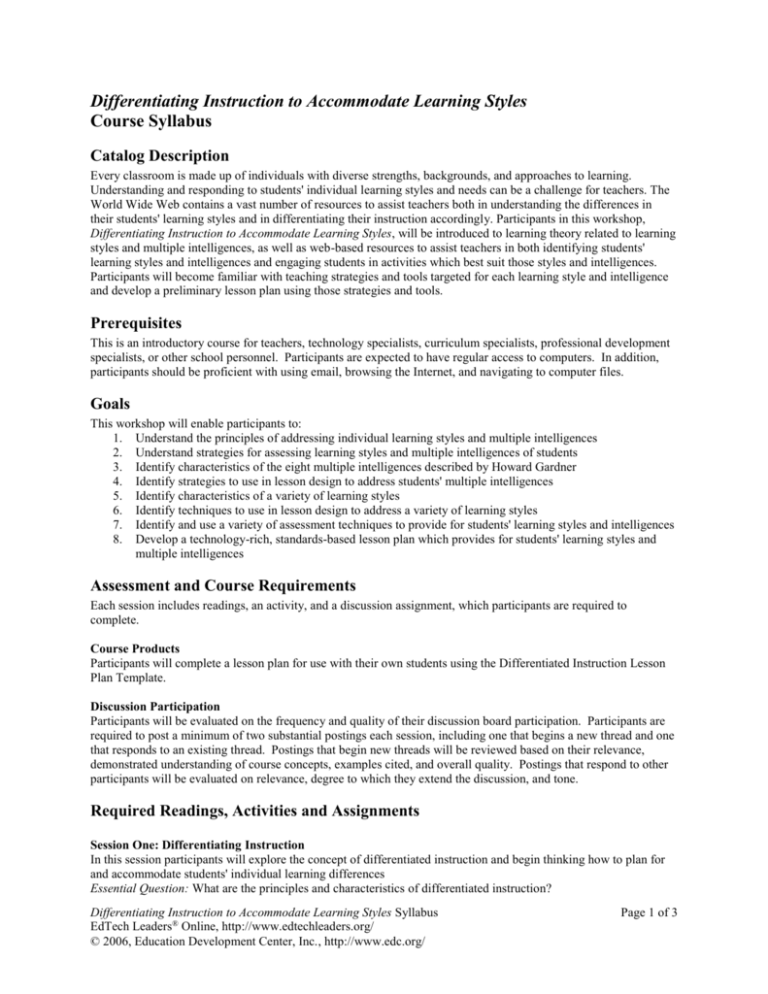
Differentiating Instruction to Accommodate Learning Styles Course Syllabus Catalog Description Every classroom is made up of individuals with diverse strengths, backgrounds, and approaches to learning. Understanding and responding to students' individual learning styles and needs can be a challenge for teachers. The World Wide Web contains a vast number of resources to assist teachers both in understanding the differences in their students' learning styles and in differentiating their instruction accordingly. Participants in this workshop, Differentiating Instruction to Accommodate Learning Styles, will be introduced to learning theory related to learning styles and multiple intelligences, as well as web-based resources to assist teachers in both identifying students' learning styles and intelligences and engaging students in activities which best suit those styles and intelligences. Participants will become familiar with teaching strategies and tools targeted for each learning style and intelligence and develop a preliminary lesson plan using those strategies and tools. Prerequisites This is an introductory course for teachers, technology specialists, curriculum specialists, professional development specialists, or other school personnel. Participants are expected to have regular access to computers. In addition, participants should be proficient with using email, browsing the Internet, and navigating to computer files. Goals This workshop will enable participants to: 1. Understand the principles of addressing individual learning styles and multiple intelligences 2. Understand strategies for assessing learning styles and multiple intelligences of students 3. Identify characteristics of the eight multiple intelligences described by Howard Gardner 4. Identify strategies to use in lesson design to address students' multiple intelligences 5. Identify characteristics of a variety of learning styles 6. Identify techniques to use in lesson design to address a variety of learning styles 7. Identify and use a variety of assessment techniques to provide for students' learning styles and intelligences 8. Develop a technology-rich, standards-based lesson plan which provides for students' learning styles and multiple intelligences Assessment and Course Requirements Each session includes readings, an activity, and a discussion assignment, which participants are required to complete. Course Products Participants will complete a lesson plan for use with their own students using the Differentiated Instruction Lesson Plan Template. Discussion Participation Participants will be evaluated on the frequency and quality of their discussion board participation. Participants are required to post a minimum of two substantial postings each session, including one that begins a new thread and one that responds to an existing thread. Postings that begin new threads will be reviewed based on their relevance, demonstrated understanding of course concepts, examples cited, and overall quality. Postings that respond to other participants will be evaluated on relevance, degree to which they extend the discussion, and tone. Required Readings, Activities and Assignments Session One: Differentiating Instruction In this session participants will explore the concept of differentiated instruction and begin thinking how to plan for and accommodate students' individual learning differences Essential Question: What are the principles and characteristics of differentiated instruction? Differentiating Instruction to Accommodate Learning Styles Syllabus EdTech Leaders® Online, http://www.edtechleaders.org/ © 2006, Education Development Center, Inc., http://www.edc.org/ Page 1 of 3 Participants will read an article from Educational Leadership written by Carol Ann Tomlinson and M. Layne Kalbfleisch, which makes important points about the need to differentiate instruction by being responsive to student levels of ability and areas of interest and aptitude. This article also by Tomlinson offers suggestions targeted to the elementary grades: Differentiation of Instruction in the Elementary Grades http://www.ericdigests.org/2001-2/elementary.html Differentiating Instruction: Meeting Students Where They Are, http://www.glencoe.com/sec/teachingtoday/subject/di_meeting.phtml Participants will begin review a high school and an elementary school example of how teachers differentiate instruction and beginning planning a lesson plan to be completed during the workshop. Session Two: Identifying Learning Styles Essential Question: What are learning styles and how can I use my knowledge of them to improve student learning in my classroom? Participants will read two articles for background understanding of common theories of learning styles. http://agelesslearner.com/intros/lstyleintro.html http://www.learning-styles-online.com/overview/ Participants will create complete at least two online inventories to identify their own learning styles and as examples of inventories they might use with their students. Session Three: Identifying Students’ Multiple Intelligences Essential Question: How can I identify multiple intelligences in my classroom and what are the implications for my teaching? Participants will read “Tapping into Multiple Intelligences” from Disney Learning Partnership http://www.thirteen.org/edonline/concept2class/month1/#2 Multiple Intelligences Theory http://facultyweb.cortland.edu/andersmd/learning/MI Theory.htm Participants will complete several multiple intelligence inventories to build knowledge and provide options for use with their students. Session Four: Learning Styles and Multiple Intelligences in the Classroom Essential Question: What are some effective techniques and tools to use in my content area(s) to address students' multiple intelligences and learning styles? Participants will read “Differentiating Instruction Finding Manageable Ways to Meet Individual Needs”, which describes a number of strategies to differentiate instruction based on learning styles. http://www.ascd.org/ed_topics/cu2000win_willis.html In addition they will read Teaching Methods: Multiple Intelligences, http://ali.apple.com/ali_sites/ali/exhibits/1000328/Multiple_Intelligences.html Participants will complete the first four steps in the Differentiated Instruction Lesson Plan Template. Session Five: Assessment Strategies to Accommodate Learning Styles and Multiple Intelligences Essential Question: What are the most effective methods to assess student outcomes when providing opportunities for students to use various learning styles and multiple intelligences? Participants will read “Five Standards of Authentic Instruction” and review two selections on using authentic assessments to determine outcomes for activities that accommodate a variety of learning styles and assessments. Authentic Tasks, http://jonathan.mueller.faculty.noctrl.edu/toolbox/tasks.htm http://www.teachervision.com/lesson-plans/lesson-4911.html http://www.teachervision.com/lesson-plans/lesson-4933.html Differentiating Instruction to Accommodate Learning Styles Syllabus EdTech Leaders® Online, http://www.edtechleaders.org/ © 2006, Education Development Center, Inc., http://www.edc.org/ Page 2 of 3 Participants will complete Steps 5 and 6 about assessments and instruction of the Differentiated Instruction Lesson Plan Template. Session Six: Share and Review Essential Question: How will I change the way I teach as a result of what I have learned in this workshop? Participants will read “Mapping a Route Toward Differentiated Instruction by Carol Ann Tomlinson, which describes techniques used by classroom teachers for reflection and consideration for their own planning. http://www.learner.org/channel/workshops/socialstudies/pdf/session5/5.MappingARoute.pdf Participants will finalize the Differentiated Instruction Lesson Plan Template and post it in the discussion forum for review and feedback by other participants. Differentiating Instruction to Accommodate Learning Styles Syllabus EdTech Leaders® Online, http://www.edtechleaders.org/ © 2006, Education Development Center, Inc., http://www.edc.org/ Page 3 of 3
